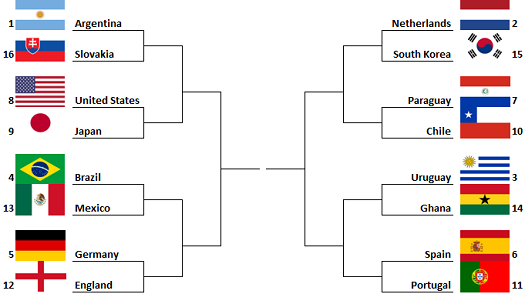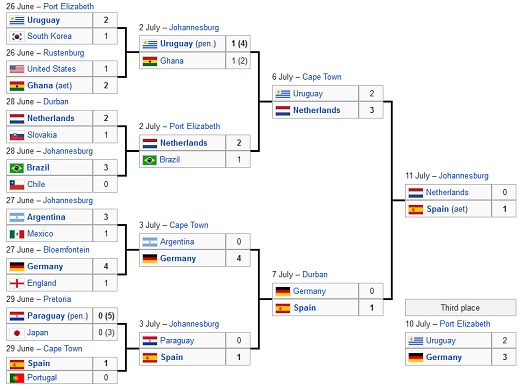I, like many sports fans, have been following the 2014 World Cup, though I share some misgivings about it as an institution (as do most conscious people). Clearly rotational hosting is both exciting and fun and showcases parts of the world that most of the developed globe doesn’t normally pay attention to, but it also extracts money from those least able to pay for it for stadiums that will sit dormant for decades and to line the pockets of the plutocrats that sit atop that particular society. This all also applies to the Olympics, which are great fun and give an outlet for nationalism that does not involve drone strikes. There’s a lot to ponder on whether the nationalism ginned up during world sporting events is actually a facilitator of dangerous jingoism or a kind of methadone for it – certainly the long-term likelihood is the latter and we should someday be fighting wars on the sports field if we still seem unable to resolve our differences through discussion. But then I see how people from the US get about their soccer team and it makes me just want to burn all the flags of every country. It kind of amazes me that our nation is still seeking validation.
In any event, this post will be driving by these political concerns which I think are important and going straight to the heart of how the World Cup playoffs are done. I didn’t used to like football/soccer very much and found it boring, but then playing FIFA video games taught me the complex strategy innate to the game and I realized that about 70 minutes of any given match are exciting, rather than three. And then, of course, I was hooked. I also have this weird thing where I specifically really like sports when the teams are nations because I like flags and other countries, even though the nationalism clearly embodied by this spirit makes me queasy. An unresolved paradox, but one that I usually set aside now to watch the World Cup or the Olympics.
I actually, parenthetically, did a pretty good review of my evolution with the so-called beautiful game last World Cup summer, in which I expressed excitement about an upcoming World Cup in Africa and Emily being in Liberia…. oops. Though I did, prophetically, conclude with the line “Anyone’s guess about where I’ll be in 2014 is as good as mine. Probably better.” I don’t think anyone will be bringing in their odds-laden tickets to exchange for a payout on that one anytime soon.
But here’s the point. The way the World Cup does playoffs is broken. You could argue that the way they do the whole Group staging is problematic to begin with, since they just make pots of countries and disperse them, but I actually think the status quo system of dividing teams for groups is pretty solid. If you’re not familiar, they make a “pot” of the top seven teams in the world, plus the host country, then three roughly regional pots for regional diversity, and each group is comprised of a random draw of one team from each of these pots. Given that part of the goal of the World Cup is mixing teams from diverse regions and this system prevents the top seven from facing each other in the first round (top eight this year since Brazil is hosting and is top-eight), I think it’s pretty viable as a system. Yes, every year someone gets anointed as the “Group of Death”, which, frankly, this year was probably not the USA’s group, but the one with Uruguay, Italy, England, and Costa Rica. Which Costa Rica, the only country therein not ranked in the top ten in the world, is assured to advance from, having beaten two prior champions. So the group thing clearly seems to work out.
The biggest problem with the World Cup draw is that the third game is often fixed. Okay, perhaps not fixed, but there are outcomes that are short of going all-out and trying to win that are favorable to a team. A team that knows it’s through to the next round might rest its starters. Two teams facing who both need a mere draw to advance might not fight it out that hard. In past years, there was overt fixing and agreements between teams to produce a certain result that would be mutually agreeable. In some instances, teams have even punted to really bad teams so that their knockout-stage competition will be weaker when they themselves are already guaranteed to go through. FIFA has recently instated a policy wherein the third-day games in each group will be played simultaneously to try to mitigate some of this problem, but not all of these adjustments depend on knowing the result of the other game. There has been rampant speculation in the US media, for example, that Germany and the US, helmed by a German coach, will agree to draw so that both teams can go through. Even the fact that people can discuss this openly, whether or not it happens, is a severe flaw in the system.
The problem is that there’s not much to play for beyond going through and especially nothing to play for beyond winning the group. This is because in the knockout stage, your opponent is merely someone else who went through from another group. Each first place team gets a second place team and that’s it. Even if this means, for example, that Mexico, a team that mightily impressed the world by collecting 7 of a possible 9 points from their group and drawing against Brazil in Brazil, just happens to get the Netherlands, defending finalists who crushed their opposition with all 9 points and a goal-differential of 10-3. Clearly this is a bad system.
There’s an obvious solution: seeding the playoff bracket. Instead of just putting A-1 against B-2 and B-1 against A-2, FIFA should rank the eight group winners as though they were all in the same group (i.e. points, then goal differential) and do the same with the eight runners-up. Then you pit the top group winner against the bottom runner-up, the bottom group-winner against the top runner-up, and so on and resolve the bracket like any normal sports playoff. Thus, every team will be directly incentivized to win every match by the maximum score, just as they are in the first two matches and every knockout stage match. The third group game is this bizarre competitive anomaly that at best gets people to play more weakly than they should and at worst creates actual rigging that cheats some teams out of the chance to go through.
We can’t run through an example of what this would look like for 2014 yet, since only two groups are finished, but I promise you that the horrifying Netherlands-Mexico match in the round of 16 would be delayed to a much later stage where it’s deserved. But we can take the example of 2010, which should be a good illustration:
Group Winners
| Team | Points | Goal Differential |
| Argentina | 9 | +6 |
| Netherlands | 9 | +4 |
| Uruguay | 7 | +4 |
| Brazil | 7 | +3 |
| Germany | 6 | +4 |
| Spain | 6 | +2 |
| Paraguay | 5 | +2 |
| United States | 5 | +1 |
Group Runners-Up
| Team | Points | Goal Differential |
| Japan | 6 | +2 |
| Chile | 6 | +1 |
| Portugal | 5 | +7 |
| England | 5 | +1 |
| Mexico | 4 | +1 |
| Ghana | 4 | 0 |
| South Korea | 4 | -1 |
| Slovakia | 4 | -1 |
I broke the one tie (South Korea/Slovakia) on how many goals were scored total, which is the prescribed method in the World Cup.
So this creates the following bracket:

For the purposes of comparison, here’s what the actual 2010 World Cup did with these 16 teams:

While the changes may not be obvious in all places (the two most exciting first-round games, Germany vs. England and Spain vs. Portugal, are actually intact!), the rubber really hits the road in the second knockout round. For example, real-life Germany vs. Argentina pitted the #5 seed vs. the #1, a matchup worthy of the semifinals, but happened in the quarters (and Argentina got trounced). Top-ranked Argentina deserved a much easier draw in the quarters, for example the winner of US/Japan. Similarly, the real quarters matched #2 Netherlands against #4 Brazil, surely creating a too-early exit for Brazil. Now, granted, the new quarterfinals create the blockbuster match of Brazil vs. Germany, but at least that’s the kind of #4/#5 matchup that we’re used to seeing as close and exciting in a quarterfinal. And #2 Netherlands can go on to get an easier draw, namely the winner of Paraguay/Chile.
Here we also see that Spain’s road to the Cup last year relied a bit more on luck than just pure skill. Maybe they would have beaten every team in last year’s knockout stage, but rather than drawing more deserved #3 Uruguay in the quarters and #2 Netherlands in the semis (their actual finals opponent), they instead got to face #7 Paraguay and #5 Germany, respectively. Not that Germany is some kind of pushover, but still. Having easier draw might have made it easier for them to have enough left to win it all by the time they faced the Netherlands.
Surely these matchups are just as exciting, but without the sheer injustice of things like this year’s Netherlands/Mexico match will be for whichever team gets eliminated therein. And more importantly, they prevent the greater injustice of collusion or strategic resting by teams that have no incentive to try to collect 9 points and maximum goal-differential. More competitive and contested games make life better for everyone – the teams, the fans, the nations. Why wouldn’t we do this?


